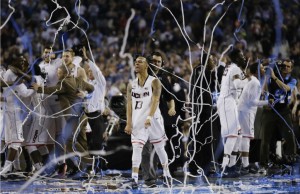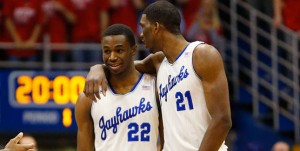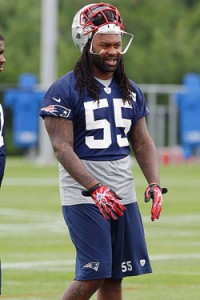In this week’s Around the Dorm, the “Ref,” Chris Molicki, asks our panel of experts three questions: should college athletes like Connecticut’s “hungry” Shabazz Napier be paid for what they do, which of Kansas’s two NBA prospects — Joel Embiid and Andrew Wiggins — should go first in the draft, and are New England’s winning ways worth a controversial culture criticized by Brandon Spikes?
1. The men’s Connecticut basketball team won the national title, but other stories surfaced from the team — namely Shabazz Napier saying there were nights he went “hungry.” Do you think college athletes should be getting any sort of payment for what they do?

Matt: College athletes should absolutely be paid for their play. Major universities make millions of dollars a season for ticket sales, memorabilia and jersey sales and TV deals. All of these things are a direct product of the athletes’ performance on the field. Student-athletes are the reason schools like Notre Dame, USC and Florida State are so popular. Look at Florida Gulf Coast as an example: Two years ago, nobody had ever heard of FGCU until their Cinderella run in the NCAA tournament, and now the university is reaping the financial benefits the athletes have earned the school. FGCU saw a 35 percent increase in admission applications after the school’s tournament run. Playing a sport in college is a full-time job, and athletes should be paid.
Gabe: This is an extremely layered issue. On one hand, many of these athletes are receiving compensation in the form of free education via scholarship. On the other, the degree to which some of these athletes are being educated is indeed questionable. This is certainly no rule of thumb, as there are plenty of institutions that don’t excuse their athletes from being held to the same academic standard. Then there’s also the fact that the NFL and NBA don’t allow players to enter their drafts immediately after graduating from high school -— and these schools, and the coaches of these programs, are raking in a ton of money. While the rules of entrance to the professional sports leagues are not up to the NCAA, it can’t hurt to provide a little bit of compensation for these athletes. Is it really too much to ask the colleges to compensate the athletes enough that they can eat well? These athletes don’t have the time to get adequate jobs during their seasons. Logically, it doesn’t seem to add up, and I think paying or providing meals for athletes should seriously be considered.
Matt wins for saying athletes lead to an increase in admissions, Gabe gets 2 points for saying schools can afford to pay, and Andrew gets 1 point for explaining the difficulties with paying.
2) Kansas teammates Joel Embiid and Andrew Wiggins have both declared for the NBA draft. Not considering Jabari Parker who may stay, if you were an NBA general manager, would you go the big-man route in Embiid or shoot for the forward potential in Wiggins?

Matt: Lottery teams will have a tough time choosing between the two. If I were a GM with the first pick, I would take Wiggins without hesitation. Wiggins averaged 17.1 points as a freshman in what was considered an up-and-down season. He showed flashes of how dominant he can be, scoring 41 points in 39 minutes played against West Virginia. Wiggins has ideal NBA size to become a scoring forward like Lebron James, Carmelo Anthony and Paul George. He averaged more points per game than eight of the last 10 first overall picks. On the other hand, Embiid has the potential to be a dominant center, a player that comes along once every decade. However, Embiid is coming off of a stress fracture in his back that made him miss the team’s last six games. Teams should be worried about the severity of this injury. Just think back to Greg Oden. The center is also a dying position in today’s NBA. The Miami Heat have won the past two titles without a true center. The NBA today is all about star scorers, and Andrew Wiggins is exactly that.
Gabe: Conventional wisdom of the last decade says take the forward in Wiggins. Both guys definitely have loads of potential, but the safe bet (based on the recent years) says the big man is less likely to avoid injuries. The hype surrounding Wiggins entering his freshman year at Kansas was the highest it’s been for an incoming freshman in some time. Embiid is a 20-year old, seven-foot, 250-pound center from Cameroon — he’s only been playing basketball for a few years now, and his nimble footwork has seen him draw comparisons to Hakeem Olajuwon. The last time it came down to taking a big or a wing like this, the Trailblazers chose the clunky Greg Oden over the slender, wiry Kevin Durant. For much of the college season, Embiid was number one in most mock drafts, but when he was forced to miss the last several weeks of the season and the NCAA tournament due to a back injury, Wiggins ultimately regained his spot at the top in most mocks. While I acknowledge that Wiggins has plenty of potential, I truly do not believe he is going to be the next Slim Reaper. In fact, I’m really not nearly as sold on this draft class living up to all its hype. But if I had to take Wiggins or Embiid, I’d take Embiid. I wouldn’t be able to pass on the best big-man prospect to enter the draft since Tim Duncan.
Andrew: The decision is a toss-up. While big-man Embiid is definitely the better pick, his health is a major concern. After hurting his back and missing the NCAA Tournament, one can only wonder his true value. If, however, Embiid remains healthy, he is definitely a no-brainer and an immediate impact player. It is tough to find an elite center, and for teams in need of a big man, Embiid fits that role nicely. As for Wiggins, he began his career with Kansas as being the biggest prospect out of high school. That said, while the sky is the limit for him, I question how his skills will translate to the NBA. Depending on what team I was managing, the big question I ask myself is whether I want to win now or wait a few years for Wiggins to develop. With everything considered, Embiid is the better pick.
Matt wins for saying teams are built around wing players, Andrew gets 2 points for highlighting the rarity of good centers, and Gabe gets 1 point for talking about big men’s injury history.
3) Brandon Spikes went on a Twitter spree, saying his time with the Patriots was “4 years a slave.” If Spikes is speaking the truth about the Patriots’ culture, do you think New England should change the way they do things despite their winning ways?

Matt: Brandon Spikes’s Twitter rant about the hallowed “Patriot way,” while entertaining, was not a good move. Spikes, who signed with Buffalo this offseason, said he was “4 years a slave” in New England. What Spikes doesn’t realize is he was also four years a winner. Although they have not won a Super Bowl in almost 10 years, the Pats have won 51 games during the span of Spikes’s time in New England, more than any other team during that time. I do not believe the Patriots have a culture problem. Yes, Bill Belichick is probably the strictest coach in the league, but I find it hard to believe that the conditions in New England are that bad. If there were slave-like conditions in New England, players would be leaving left and right. The Patriots have already re-signed five of their free agents, so clearly players are happy with their situation. I doubt veterans like Vince Wilfork would re-sign if conditions were truly terrible. If the “Patriot culture” means winning football games, then Brandon Spikes is the problem here. Maybe he simply didn’t fit in with the Patriots’ expectations on player conduct. Either way, get used to losing, Spikes.
Gabe: While the Patriots haven’t won a Super Bowl since 2005, they should not and will not change anything about their culture. The opinion of one man, Brandon Spikes, means next to nothing in the big scope of things. If Tom Brady had said it, it’d be a big deal, no doubt. The Patriots haven’t won a Super Bowl since the Spygate controversy, and they may not have enough talent to win another one in the Brady Era, but Bill Belichick isn’t going anywhere anytime soon.
Andrew: In football, it doesn’t matter how nice a person is. It doesn’t matter when someone was drafted. All that truly matters are the results. While Spikes may say he was a slave during his time with the Patriots organization, no one can argue the Pats’ success over the past four years. In that time span, New England won all AFC East Titles and reached the Super Bowl in 2011. The Bills — who have not had a playoff appearance since 1999 — will predictably have a similar year to last one. It will be interesting to see what Spikes says after his one-year contract runs out and whether he misses his winning ways.
Andrew: Under no circumstances should college athletes get paid for playing their designated sport. One could argue that Napier is already getting paid through an athletic scholarship. While Napier may say he was hungry, throughout his four years, he received a free education worth over $120,000. That money saved is more than enough to cover the cost of food.The other problem with paying college athletes is there are a lot of gray areas. Johnny “Football” Manziel believes he deserved to be paid. While statistically he is more valuable than the second-string punter, universities would have a very difficult time determining who should be paid and figuring out their worth.
All three players get 2 points for making the same argument that the Pats keep winning and Spikes seems like a disgruntled player.
Matt wins Around the Dorm, 8-5-5






